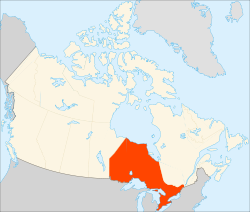Portal:Ontario
The Ontario Portal


Ontario (/ɒnˈtɛərioʊ/ on-TAIR-ee-oh; French: [ɔ̃taʁjo]) is the southernmost province of Canada. Located in Central Canada, Ontario is the country's most populous province. As of the 2021 Canadian census, it is home to 38.5 percent of the country's population, and is the second-largest province by total area (after Quebec). Ontario is Canada's fourth-largest jurisdiction in total area of all the Canadian provinces and territories. It is home to the nation's capital, Ottawa, and its most populous city, Toronto, which is Ontario's provincial capital.
Ontario is bordered by the province of Manitoba to the west, Hudson Bay and James Bay to the north, and Quebec to the east and northeast. To the south, it is bordered by the U.S. states of (from west to east) Minnesota, Michigan, Ohio, Pennsylvania, and New York. Almost all of Ontario's 2,700 km (1,700 mi) border with the United States follows rivers and lakes: from the westerly Lake of the Woods, eastward along the major rivers and lakes of the Great Lakes/Saint Lawrence River drainage system. There is only about 1 km (5⁄8 mi) of actual land border, made up of portages including Height of Land Portage on the Minnesota border.
The great majority of Ontario's population and arable land is in Southern Ontario, and while agriculture remains a significant industry, the region's economy depends highly on manufacturing. In contrast, Northern Ontario is sparsely populated with cold winters and heavy forestation, with mining and forestry making up the region's major industries. (Full article...)
Selected article -
The University of Toronto (UToronto or U of T) is a public research university in Toronto, Ontario, Canada, located on the grounds that surround Queen's Park. It was founded by royal charter in 1827 as King's College, the first institution of higher learning in Upper Canada. Originally controlled by the Church of England, the university assumed its present name in 1850 upon becoming a secular institution. As a collegiate university, it comprises 11 colleges each with substantial autonomy on financial and institutional affairs and significant differences in character and history. The university maintains three campuses, the oldest of which is St. George, located in downtown Toronto. The other two satellite campuses are located in Scarborough and Mississauga.
The University of Toronto offers over 700 undergraduate and 200 graduate programs. The university receives the most annual scientific research funding and endowment of any Canadian university. It is also one of two members of the Association of American Universities outside the United States, alongside McGill University. Academically, the University of Toronto is noted for influential movements and curricula in literary criticism and communication theory, known collectively as the Toronto School.
The university was the birthplace of insulin and stem cell research, the first artificial cardiac pacemaker, and the site of the first successful lung transplant and nerve transplant. The university was also home to the first electron microscope, the development of deep learning, neural network, multi-touch technology, the identification of the first black hole Cygnus X-1, and the development of the theory of NP-completeness. The University of Toronto is the recipient of both the single largest philanthropic gift in Canadian history, a $250 million donation from James and Louise Temerty in 2020, and the largest ever research grant in Canada, a $200 million grant from the Government of Canada in 2023. (Full article...)General images
Surrounding areas
Selected biography -
Wayne Douglas Gretzky CC (/ˈɡrɛtski/ GRET-skee; born January 26, 1961) is a Canadian former professional ice hockey player and former head coach. He played 20 seasons in the National Hockey League (NHL) for four teams from 1979 to 1999, retiring at the age of 38. Nicknamed "the Great One", he has been called the greatest ice hockey player ever by many sportswriters, players, The Hockey News, and the NHL itself, based on extensive surveys of hockey writers, ex-players, general managers and coaches. Gretzky is the leading career goal scorer, assist producer and point scorer in NHL history, and has more career assists than any other player has total points. He is the only NHL player to total over 200 points in one season, a feat he accomplished four times. In addition, Gretzky tallied over 100 points in 15 professional seasons, 13 of them consecutive. At the time of his retirement in 1999, he held 61 NHL records: 40 regular season records, 15 playoff records, and 6 All-Star records.
Born and raised in Brantford, Ontario, Gretzky honed his skills on a backyard rink and regularly played minor hockey at a level far above his peers. Despite his unimpressive size and strength, Gretzky's intelligence, stamina, and reading of the game were unrivaled. He was adept at dodging checks from opposing players, and consistently anticipated where the puck was going to be and executed the right move at the right time. Gretzky became known for setting up behind his opponent's net, an area that was nicknamed "Gretzky's office". (Full article...)Selected image
Did you know? -
- ... that nearly every person in Val Gagné, Ontario, died in the 1916 Matheson Fire, and the settlement was renamed to honour the heroic efforts of the parish priest?
Related projects and portals
Topics
Categories
Things you can do
- Help expand stub articles: There are numerous stub articles relating to Ontario. You can help by expanding them. See Ontario stubs for a list. Also, for geographical (places) stubs, refer to:
- Eastern Ontario: Eastern Ontario geography stubs
- Toronto: Toronto geography stubs
- Ottawa: Ottawa stubs - All stubs relating to Ottawa in general
- Northern Ontario: Northern Ontario geography stubs
- Western Ontario: Western Ontario geography stubs
- Golden Horseshoe: Golden Horseshoe geography stubs
Associated Wikimedia -
The following Wikimedia Foundation sister projects provide more on this subject:
-
Commons
Free media repository -
Wikibooks
Free textbooks and manuals -
Wikidata
Free knowledge base -
Wikinews
Free-content news -
Wikiquote
Collection of quotations -
Wikisource
Free-content library -
Wikiversity
Free learning tools -
Wikivoyage
Free travel guide -
Wiktionary
Dictionary and thesaurus









































